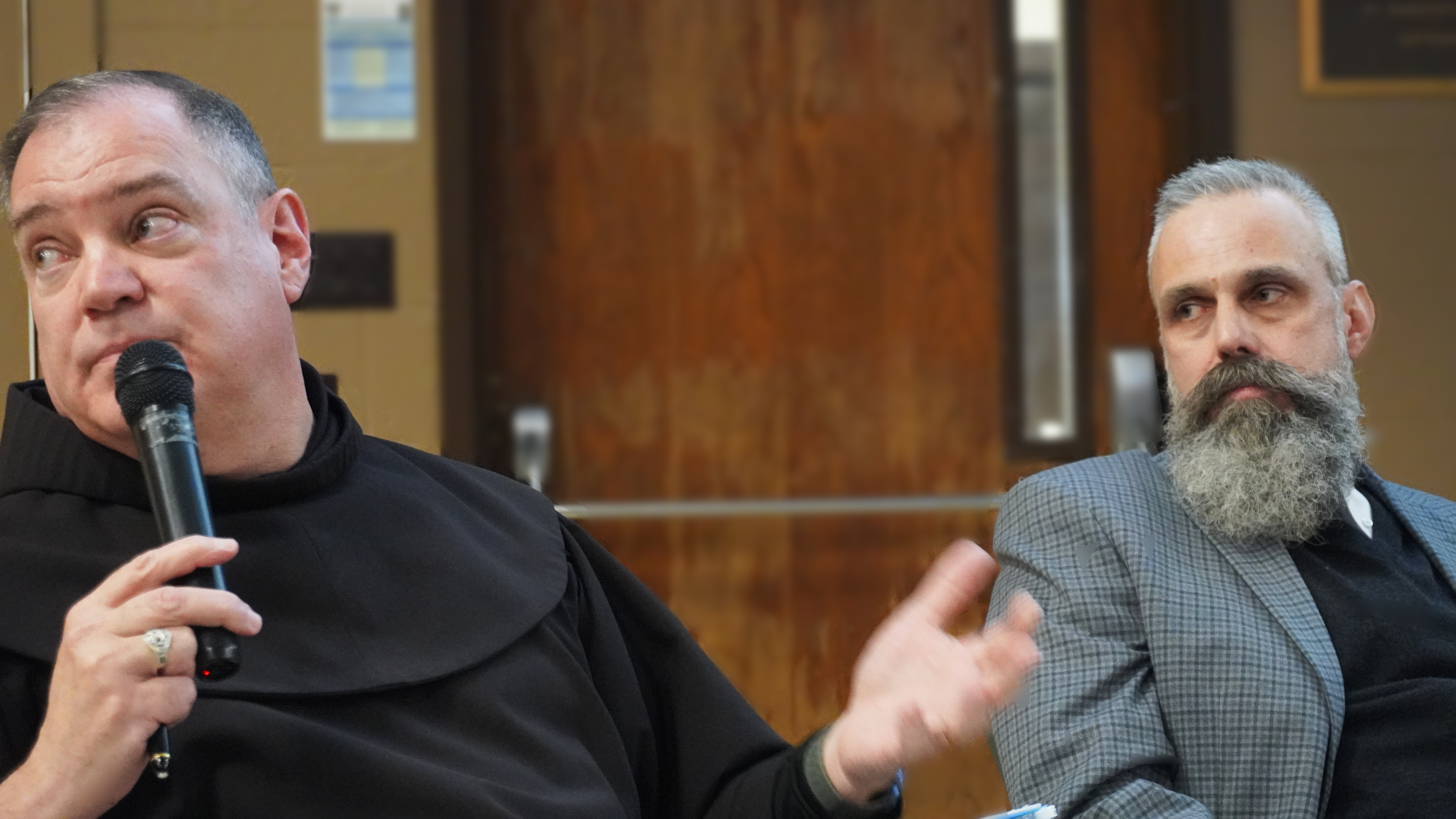By Nate West
News Editor
The Backstory
On Jan. 7, the Bona Venture received an email with the subject line ‘Potential gay rights story.’
The email, sent by an alum, brought to light the situation of his friend (also a Bonaventure alum, both of whom will remain anonymous) whose marriage announcement was rejected from the St. Bonaventure alumni magazine, BonAlumnus, on account of him being transgender.
“I learned this after a transgendered friend, who asked that I not pass his name along, posted on Facebook that the magazine would not post information about his gay marriage,” the email said. “In an outrage, I called and spoke with a representative of the BonAlumnus (Beth Eberth, the magazine’s editor). We had a tense but cordial discussion where she confirmed that the magazine will not run announcements for gay marriage, even though it is now legally recognized in New York State and elsewhere,” (the Marriage Equality Act was passed by the New York State Legislature on June 24, 2011).
Two days later, on Jan. 9, the Bona Venture received a second email from the same individual.
“(Eberth) told me the policy works this way because the Church does not acknowledge gay marriage,” the email read. “I’m not sure how familiar you are with Catholic Church doctrine, but the church also doesn’t acknowledge second marriages unless it was annulled or if the spouse from the first marriage is deceased. I asked Beth if BonAlumnus checks if marriage announcements are vetted to ensure no divorcees (w/o annulments) are getting published. She said they do not.”
The Reasoning
“We want people to know we gave this issue a lot of consideration and a lot of thought,” Eberth said. “We also want people to know our alumni are very important to us and we regret that in this instance this alum was disappointed in this decision, because we know that this was disappointing to them.”
The issue, of course, is the university policy that same-sex marriage announcements will not be run on account of Bonaventure’s affiliation with the Catholic Church.
“What the decision finally came down to was this is the Catholic Church’s stance on this issue. It does not recognize same-sex marriages and we are a Catholic institution and we could not fly in the face of that,” Eberth said.
Brother Ed Coughlin, O.F.M., said that same-sex marriage has become more and more complicated with regards to the church as it’s become a bigger issue in our society.
“I think this is one of those situations where to be a university in the Catholic-Franciscan tradition, there are points where that becomes a tense, or possibly conflicted situation,” Brother Ed said. “Catholic universities are continually trying to negotiate and this becomes very complicated in the Church, which has a lot of polarization and a lot of disagreement.”
According to the Catechism of the Catholic Church, found on the Vatican’s official website, the Catholic Church states homosexual acts are, “contrary to the natural law. They close the sexual act to the gift of life. They do not proceed from a genuine affective and sexual complementarity. Under no circumstances can they be approved.”
Although the decision might be controversial, it’s a position we have to respect, Brother Ed said.
“Many people say, ‘Well, you want to call this a civil union?’ and basically the gay community says ‘Well, we’re not really equal if we can’t use the title marriage,’ even though for centuries, Catholics and non-Catholics have always understood marriage to be a commitment between a man and a woman,” Brother Ed said. “We have to respect the fact that this is the Church’s decision; marriage is exclusive between a man and a woman, and the only kind of sexual activity that is proper, according to the mind of the Church, is that within a marriage.”
The Controversy
“It’s a clear example of outright discrimination against same-sex couples.”
Those are the words of Robert Amico, professor of philosophy and former faculty adviser to Spectrum, St. Bonaventure’s officially-sanctioned LGBT group. Amico said he remembers a similar situation back when Spectrum was beginning.
“One of the arguments that was out there was if we have a LGBT group on campus that is an officially-sanctioned group of the university, some people would stop donating,” he said. “It was interesting that that year I got a letter from an alum who had a really bad experience at Bonaventure because he was gay. It took him a long time to get over what he felt was the damage that was done to his self-esteem because of the homophobia. He said he would never donate to Bonaventure because it wasn’t a place that supported him and his identity. When he found out that we were going to have an officially-sanctioned group of the LGBT community on campus, he said he would donate.”
Amico said it seems contradictory of the university to have both Spectrum and a policy that won’t run same-sex marriage announcements.
According to Brother Ed, however, it’s not. The Catholic Church accepts homosexual individuals, but not marriage between them or their sexual activity, he said.
“The church understands persons are born with a same-sex orientation and therefore they’re entitled to ministry in the Church,” Coughlin said. “A person doesn’t choose their sexual orientation and by virtue of that, if you’re a baptized person, you’re entitled to ministry.”
In the Jan. 9 email, the university’s policy on divorces and second marriages is brought up. According to Beth Eberth, there is no protocol for checking on second marriages.
“We do not investigate whether heterosexual couples, whether it’s their first or second marriage, whether they’ve been divorced or had an annulment. We do not investigate that,” Eberth said.
Amico believes rather than investigating alumnus on their marriages or orientation, BonAlumnus should not discriminate against anyone. There is no reason to single out members of the LGBT community, he said.
“I think their policy of discriminating against those who are LGBT and are getting married, regardless of what the church’s position on same-sex marriage, but none-the-less, they’re alums,” Amico said. “Why would you have a policy that withholds that information? It’s hypocritical.”
The Other Schools
There was no policy in place when Eberth was presented with the situation of running the announcement, she said.
“The question had been raised amongst the communication office when New York State approved same-sex marriages,” Eberth said. “Then when the alumnus contacted us, discussions increased. We discussed with the editorial board for the magazine, University Ministries and Emily Sinsabaugh from University Relations amongst others.”
Both Brother Ed and Eberth said they were in contact with other Catholic colleges and universities in order to make the best decision.
“We’ve engaged various colleagues at other institutions — how are other people thinking about this?” Brother Ed said. “I contacted a moral theologian at Boston College, a friar who teaches there and asked him what his thinking was on this is.”
Eberth didn’t reveal what colleges she was in contact with.
Lori Lasch, editor of fellow Franciscan university Siena College’s alumni magazine, said their magazine does run same-sex marriage announcements.
“It was a discussion we brought to the Board of Trustees this past January or February,” Lasch said. “We don’t use the term ‘marriage’ though. We use ‘wed’ for straight and same-sex couples.”
In the print version of their magazine, Siena only uses text to announce weddings. Photos and text are posted online, according to Lasch.
A representative from Canisius College said its alumni magazine hasn’t had a request for a same-sex marriage announcement, so there is no policy in place. The representative said they probably would, but would have to check with some administrators first.
Niagara University sent out a newsletter to alumni of its theater program. In it, they ran a birth notice for a same-sex couple. A representative from Niagara’s alumni office said that would serve as a precedent.
“We have no written policy on it yet,” the representative said. “We’ve discussed about it before. We’re inaugurating a new president, though, so we’ll see.”
The Final Thoughts
Despite rejecting the marriage announcement, the university sent a letter to the house of the man asking for donations, the Jan. 7 email said.
According to Mary Driscoll, vice president for university advancement, if the university saw a decrease in donations as a result of the policy, it’s too early to tell if it would be altered.
“As far as changing policy and procedure, we, the administration, wouldn’t do that on our own,” Driscoll said. “We would have to go to our board. We would have to really justify why. Non-profits need to stay true to their mission. If you don’t and the administration isn’t staying true to their mission, I think we’re doing a disservice to our public.”
Amico thinks it’s all about donations. He believes the university doesn’t want to offend anyone who is a potential donor.
Brother Ed, however, said this was the right decision based off the current state of the discussion of same-sex marriage in the Catholic church.
“We’re in the middle of a very huge social discussion here,” Brother Ed said. “I think it does come within the university and the Catholic-Franciscan tradition, there are certain points where the two would clash or disagree about things and we have to be as prudent as we can be about how we proceed on that.”
Amico said it’s discrimination, simple as that.
“It would seem to me that to actively screen out same-sex marriage announcements is hardly what I would call a respectful treatment and respecting the dignity and worth of every human being,” he said. “I feel offended by this practice. I feel embarrassed that the university would make such a decision.”







